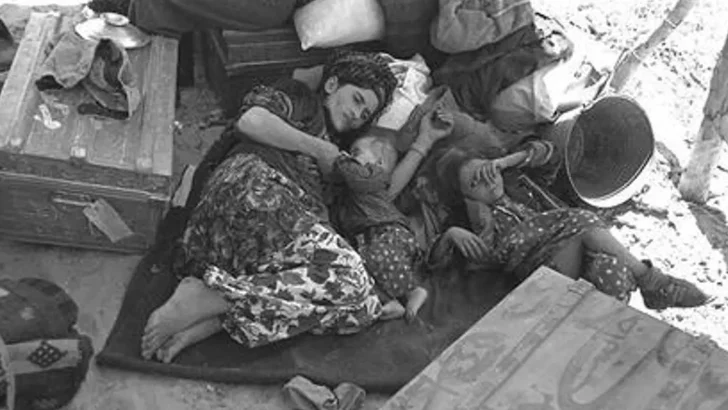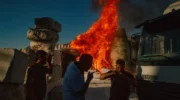British-Israeli historian Avi Shlaim cites ‘incontrovertible evidence’ from former Jewish agent showing Zionists bombed sites to encourage migration to Israel
By Rayhan Uddin, reposted from Middle East Eye, June 19, 2023
A police report and an interview with a former Zionist operative form the basis of Avi Shlaim’s claim that he has uncovered “undeniable proof” of Israeli involvement in bombings which drove Jews out of Iraq in the early 1950s, the British-Israeli historian told Middle East Eye.
Shlaim’s autobiography Three Worlds: Memoirs of an Arab-Jew, published earlier this month, details his childhood as an Iraqi Jew and subsequent exile to Israel.
It also includes research about a number of bombings in Iraq which prompted a mass exodus of Jews from the country between 1950 and 1951, most of whom, like he and his family, ended up in Israel.
On Sunday, Shlaim told Middle East Eye that he had uncovered “incontrovertible evidence of Zionist underground involvement in the bombs”.
As part of the evidence, the historian cited an extensive interview he carried out with Yaakov Karkoukli, a former member of the Zionist underground in Baghdad in the 1950s.
Karkoukli – who was aged 89 when he spoke to Shlaim for the book – was an associate of Yusef Basri, a Zionist intelligence operative in Iraq who was convicted by Iraqi authorities of having carried out bombings targeting Iraqi Jews.
‘Terrorise and not kill’
The bombings at the time included attacks on a coffee shop, a car dealership and a synagogue, among other attacks on Jewish communities and businesses.
Karkoukli said that Basri carried out three of those attacks on Jewish sites upon the orders of Meir Max Bineth, an Israeli intelligence officer who supplied Basri with grenades and TNT explosives.
As well as weapons, Bineth allegedly provided Basri with maps, intelligence and instructions, which included an order “to terrorise and not to kill”.
Basri, along with another Zionist underground operative, Shalom Salih Shalom, were convicted and executed by Iraqi authorities over the bombings.
A third underground operative, Yusef Khabaza, was also sentenced to death in absentia, but escaped Iraq.
Karkoukli insists that an attack on the Masuda Shemtov synagogue in Baghdad in January 1951 – the only bombing at the time to result in Jewish deaths – was not directly carried about by Zionist operatives, but by a Muslim Arab.
Bineth, who allegedly gave Basri orders, would later commit suicide after being arrested by Egyptian authorities over his suspected involvement in the Lavon Affair, a failed Israeli false flag operation to plant bombs in Egypt and blame them on the Muslim Brotherhood and leftists.
Israeli officials have long rejected any Zionist underground or official Israeli involvement in attacks on Iraqi Jews, and instead blamed them on Iraqi nationalists.
“This is not a second-hand but a first-hand testimony by a participant,” Shlaim told MEE, referring to his interview with Karkoukli.
“True, this is oral history and therefore not conclusive, though it is inconceivable that Karkoukli would have made up the whole story.”
But the historian added that Karkoukli had provided more conclusive evidence than just his own testimony, in the form of a police report.
Police report
Shlaim received a copy of the Baghdad police report on the trial of Basri and his associates, which Karkoukli had obtained from a retired Iraqi police officer.
The report, a translation of which is included in the book and has been sent to MEE, includes details of confessions from both Shalom and Basri, where they admit to throwing bombs at Iraqi Jewish targets. Shalom also implicates Khabaza in his confession.
“No one except the police investigators could have had all the details contained in this report,” Shlaim said. “This report is clearly not a fabrication but I took one more step to authenticate it.”
The historian explained that he confirmed the veracity of the police report through Iraqi journalist Shamil Abdul Qadir, who was in possession of a 258-page Baghdad police dossier on the interrogation of alleged Zionist agents.
Abdul Qadir verified the police report, and said that it was based on the dossier he was in possesion of. An image of the cover page of the dossier was seen by MEE.
“The police report which I reprint in my book is thus incontrovertible evidence of Zionist underground involvement in the bombs,” Shlaim said. “If you wish, this is the smoking gun.”
Synagogue attack
The attack on the Masuda Shemtov synagogue, which killed four Jews, was carried out by a Muslim man of Syrian origin called Salih al-Haidari, according to Karkoukli.
Karkoukli claimed to be “the only person in the world” who knew who had carried out that attack.
He said that Haidari was put up to the attack by a corrupt Iraqi police officer who had received a bribe from the Zionist underground. Shlaim said there was no further corroborating evidence to back the claim up.
Around 110,000 Jews fled Iraq following the bombings, most of them settling in the nascent state of Israel.
Over 800,000 Jews either left or were expelled from countries in the Middle East and North Africa between 1948 and the early 1980s.
As of 2005, 61 percent of Israeli Jews were of full or partial Mizrahi ancestry – the sociological term coined to refer to Jews from the region following the creation of Israel.
The attacks on Iraqi Jews came less than two years after the ethnic cleansing that took place in what Palestinians call the Nakba (catastrophe), which led to the creation of the state of Israel in 1948.
Zionist forces killed 13,000 Palestinians, destroyed and depopulated around 530 villages and towns, committed at least 30 massacres, and expelled 750,000 people during the Nakba.
More than 6,000 Israeli Jews, including 4,000 soldiers and 2,000 civilians, were killed, as well as around 2,000 troops from Arab countries.
Shlaim states in the book that Iraqi Jews did not face antisemitism until the 1940s, when they were suspected of being complicit in the British invasion of Iraq in 1941 and in the Nakba.
He adds that the Zionist project led to Jews from all across Arab countries going from respected fellow citizens to akin to a fifth column allied with the new Jewish state.
Rayhan Rayhan is a Middle East Eye journalist based in London, with an interest in the UK, MENA, social media, sports and human rights. He has previously contributed to The Guardian, The Spectator and New Statesman
RELATED:




